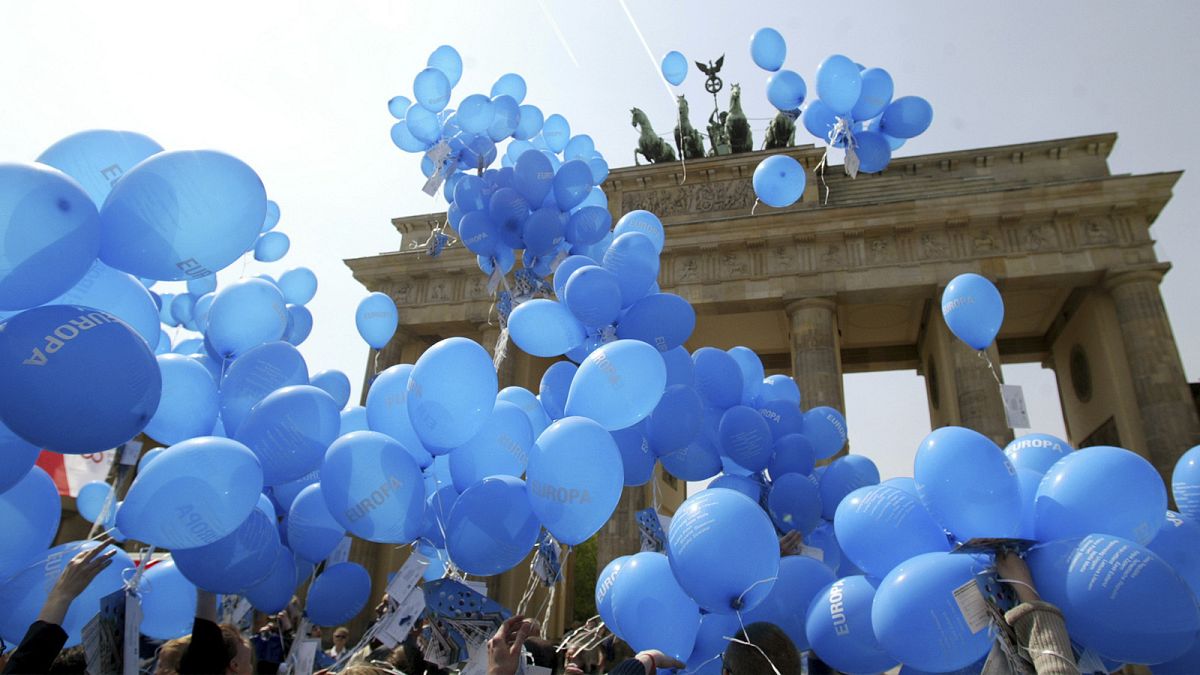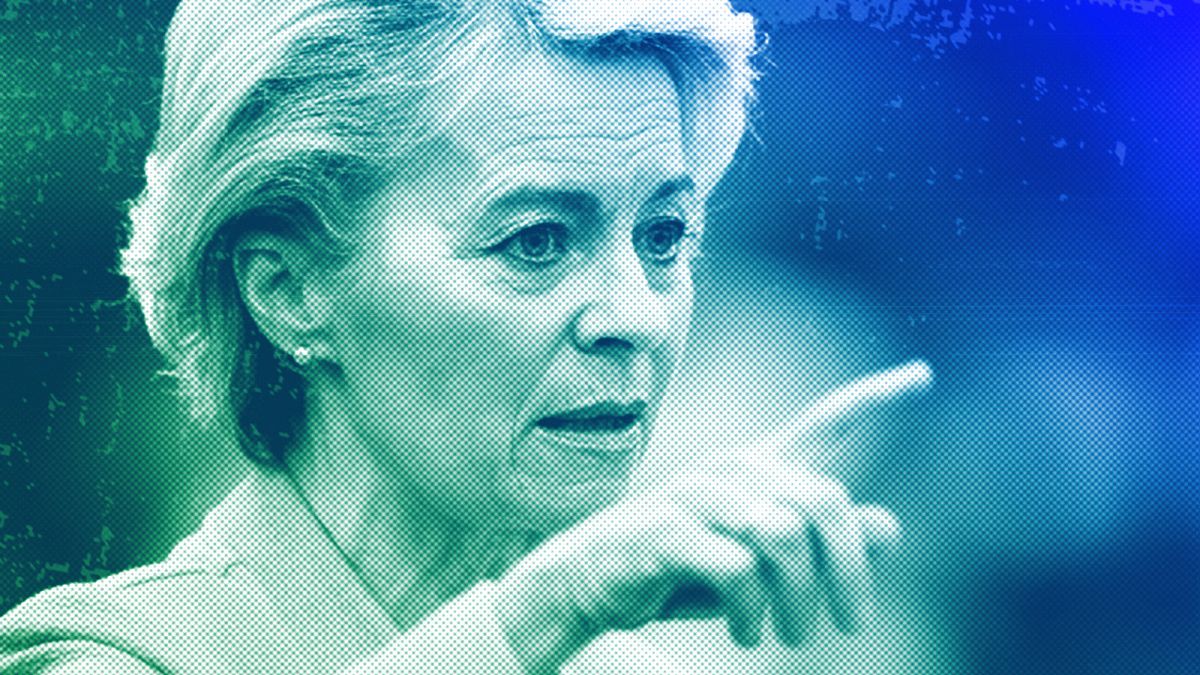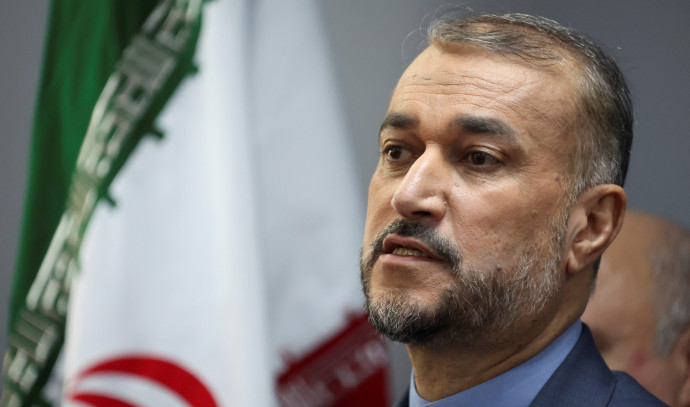World
Why the Global South is against the EU’s anti-deforestation law
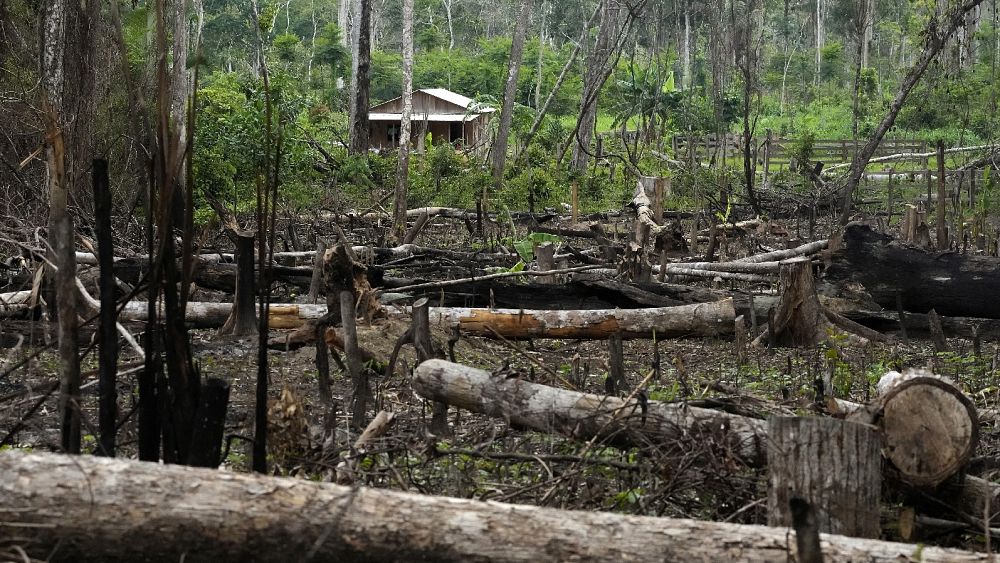
Seventeen countries from the so-called Global South have expressed their exasperation at the European Union’s anti-deforestation legislation and the impact it could have on their exports of commodities such as soy, palm oil, cocoa, beef, coffee or timber.
Ambassadors from 17 countries described the EU regulation on deforestation-free products (EUDR) as an “inherently discriminatory and punitive unilateral benchmarking system that is potentially inconsistent with WTO obligations” in a letter sent to EU Commission and Parliament officials earlier this month.
The signatories — from Argentina, Brazil, Bolivia, Colombia, Dominican Republic, Ecuador, Ghana, Guatemala, Honduras, Indonesia, Ivory Coast, Malaysia, Mexico, Nigeria, Paraguay, Peru, and Thailand — called for a change to the legislation and “open dialogue” about possible mitigation measures, in particular to help small and medium-sized companies.
The EUDR, which entered into force in late June, establishes specific criteria about traceability, certification and customs procedures for products that enter the EU internal market to bar imports of products that lead to deforestation or forest degradation.
Operators and traders have 18 months to adapt to the EUDR rules, with a longer adaptation period for micro and small enterprises.
The new classification system
“The legislation is unilateral, as it was created without an effective dialogue with producer countries and without being supported by any agreement negotiated at international level,” Pedro Miguel da Costa e Silva, Brazil’s ambassador to the EU, wrote to Euronews.
“We are partners with the EU in various multilateral environmental forums and at the WTO. We were hoping for a more cooperative approach,” he added, stressing that Brazil is “the EU’s largest external supplier of agricultural products”.
He deplored the new classification system on which the law depends which he said focuses mainly on agricultural products and which sorted countries into risk categories — high, low, and standard. This, he said, imposes differentiated conditions for access to the European market.
For Indonesia, one of the world’s largest exporters of wood products, palm oil, cocoa and coffee, the EU’s law disregards these countries’ efforts to balance nature conservation with people’s livelihoods and fails to provide them with adequate access to expertise, financial and technical assistance.
“With this unilateral benchmarking system, the EU will give a stamp to any country whether the country is the proponent of environment or the opponent, disregarding to some extent its efforts to combat climate change and deforestation in its region,” Andri Hadi, Indonesia’s ambassador to the EU, said.
“The EU’s one-size-fits-all approach as adhered to by the EUDR does not take into consideration the differences and specificity of each country, whether it be the flora, fauna or its people and its traditions,” he added.
The letter even goes as far as suggesting that the legislation will not only be ineffective in its efforts to protect forests worldwide but will have collateral damages such as increased poverty, diversion of resources and hindrance of the attainment of the United Nations’ Sustainable Development Goals by 2030.
The European Commission is aware of the concerns but rejects the discriminatory label, as “it will also be applied to domestic producers”, Adalbert Jahnz, a spokesperson for Virginijus Sinkevičius, the European Commissioner for Environment, Maritime Affairs and Fisheries, told Euronews.
“Therefore, it will be implemented in an even-handed manner that does not constitute arbitrary or unjustifiable discrimination for third-country producers, or a disguised restriction to trade. It was designed to be fully compatible with World Trade Organization rules,” he added.
EU unlikely to amend the law
The EU’s executive said dialogue is going to be enhanced, both bilaterally and in multilateral fora and, in the case of Indonesia and Malaysia, through a dedicated Task Force.
But there is no doubt that Brussels institutions have no appetite to change the law.
“At this moment in time, the regulation is the law of the land in the EU and amending the regulation would require a lengthy process of the EU’s ordinary legislative procedure – a prospect that is currently not on the cards,” David Kleimann, a political analyst at Bruegel think tank, told Euronews.
“The European External Action Service is currently heavily engaged in communicating the compliance requirements of the regulation at the WTO and in the countries that are most affected. The question is really whether the EU can put in place sufficient flanking measures to keep compliance costs for small and medium enterprises low,” he said.
The European Parliament, one of the driving forces for more ambitious EU policies to fight climate change, is also not keen on the idea as forests are essential for carbon dioxide storage.
For Bernd Lange (S&D, Germany), chair of the parliamentary International Trade Committee, the law “sends a clear message to the world that we are ready to take responsibility and actively work on solutions.”
“All of this can only happen in true partnership. Pointing fingers and lecturing will not help at all and is not the European approach.”
“In (the) legislation itself, there is an emphasis on acting together. For example, we have established a task force with Indonesia for the joint implementation of legislation, and we have discussed joint implementation and certifications in Brazil, where we have also set up a global gateway project for traceability,” Lange added.
Could this be headed for WTO arbitration?
The main driver of global deforestation is the expansion of agricultural land and the topic fuels highly intense political debate, including in the EU, as displayed during the recent Nature Restoration Law debacle that pitted environmentalists against farmers.
With this law, the EU, a major consumer of agricultural commodities, not only wants to reduce its commercial role in forest destruction but also prove its climate commitments to the world. Global partners, however, are warning that the EU needs to be more diplomatic in its endeavours, especially as it needs to bolster alliances if it wants to become less dependent on certain countries, such as China, for critical natural resources.
Indonesia’s ambassador called for any “trade disruption” to be avoided, adding that “bringing the case to WTO for the time being is too early as the regulation is not yet implemented”. He said, however, that “it stands as an option and a last resort”.
His Brazilian counterpart said that they “expect the EU to be open to effective and real dialogue, on equal terms, with producer countries, which includes regulating legislation in a reasonable way, recognising the sustainable production practices of producer countries”.
“It should be extremely careful in the process of classifying products and countries. Reality will not adapt to legislation. It is the legislation that needs to take into account and adapt to a very complex and diverse reality,” he added.
For Kleiman, the analyst, “the letter should be viewed as a desperate cry for help that the EU should take very seriously” in order to appease the fact that it put forward a “unilateral” regulation that would violate the non-discrimination obligations under WTO law.
Still, he added, a WTO process is unlikely to bring much to the plaintiffs as “WTO GATT general exception for policies that are effective in protecting exhaustible natural resources from depletion”.

World
Turkish police arrest hundreds at Istanbul May Day protests

Authorities deployed more than 40,000 police officers across the city after banning protests in Taksim Square.
Police in Istanbul have used tear gas and rubber bullets to disperse protesters who tried to break through a barricade to reach the city’s Taksim Square in defiance of a ban on May Day rallies.
Turkish Interior Minister Ali Yerlikaya said 210 people were arrested on Wednesday.
More than 40,000 police were deployed across the city, blocking even small side streets with metal barriers after President Recep Tayyip Erdogan said on the eve of May Day that the annual protests would not be allowed to take place in the square.
Tall metal barriers were put up around the square – a traditional focal point of protests in Istanbul, where authorities have banned rallies since 2013, when it was the focus of demonstrations against Erdogan’s government.
On X, Yerlik said that “210 people were detained in Istanbul after failure to heed our warnings and attempting to walk to the Taksim Square and attack our police officers on May 1 Labour and Solidarity Day.”
Police clashed with demonstrators near city hall in the Sarachane district, firing tear gas and rubber bullets to stop protesters from breaching barricades, the AFP news agency reported.
“We have demonstrated our will to celebrate May Day at Taksim Square. We have legal grounds,” Arzu Cerkezoglu, secretary general of the Confederation of Revolutionary Trade Unions of Turkey (DISK), told AFP.
“Taksim is an important symbol for us. Taksim means May Day, Taksim means labour,” she said.
In 2023, Turkey’s top constitutional court ruled that the closure of Taksim Square for protests was a violation of citizens’ rights. The square was a rallying ground for May Day celebrations until 1977, when at least 34 people were killed during demonstrations. Authorities opened it up again in 2010, but it was shut again after the 2013 protests.
City locked down
Main roads across Istanbul were closed to traffic while public transport including ferries and subway trains was halted because of the security clampdown. Landmarks such as the Topkapi Palace were cordoned off.
On Monday, Yerlikaya said Taksim would be out of bounds for rallies to stop “terrorist organisations” from using it for “propaganda”.
Turkey’s main opposition Republican People’s Party (CHP) and unions had pressed the government to open the square for labour rallies, but Erdogan warned on Tuesday against any provocation.
CHP leader Ozgur Ozel, accompanied by Istanbul’s Mayor Ekrem Imamoglu and labour unions, gathered in the Sarachane neighbourhood.
“We will keep on fighting until Taksim is free,” Ozel said. “Taksim belongs to the workers.”
Addressing the police, Ozel declared: “These workers are not your enemies. Our only desire is for the day to be celebrated as a festival. We do not want conflict.”
World
Most Americans See TikTok as a Chinese Influence Tool, Reuters/Ipsos Poll Finds
World
Biden admin sanction waivers give Iran access to billions in funds to keep war efforts going, expert says
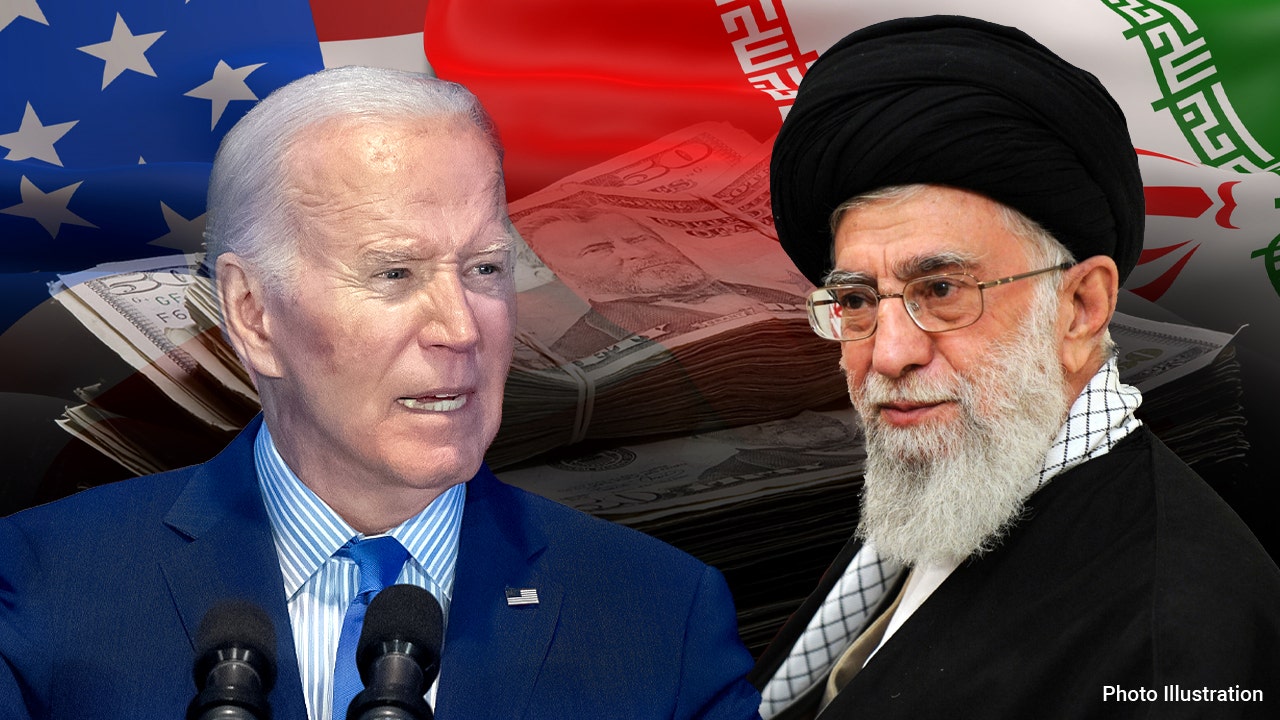
The Biden administration has allowed billions in sanctions waivers that benefit Iran, with estimated billions more in unsanctioned oil sales, which allows the Iranian government to continue diverting money to its drone factories and funding proxy groups, an expert told Fox News Digital.
“What happens when you end up releasing that money is that it goes into the general funds, which can then be used in lots of different ways,” Jonathan Schanzer, senior vice president for research at the Foundation for Defense of Democracies (FDD), explained.
“If they are using the sanctions relief to fund their general budget, then ultimately [they] are to the benefit of the IRGC because the IRGC partakes in that regular budget,” Schanzer said, noting the Biden administration has often argued that any waivers do not ultimately and directly benefit the Iranian military and the Islamic Revolutionary Guard Corps (IRGC).
“Let me put it this way: There is no way to do it without ultimately benefiting the regime and its ultimate objective, which is to fund its malign activities abroad,” Schanzer, a former terrorism finance analyst at the U.S. Department of the Treasury noted.
TEHRAN ‘RELIGIOUSLY’ BROADCASTING ANTI-ISRAEL UNREST AT US SCHOOLS FOR PROPAGANDA, EXPERT SAYS
A State Department spokesperson told Fox News Digital that the Biden administration “has not lifted a single sanction on Iran. Rather, we continue to increase pressure.”
“Our extensive sanctions on Iran remain in place, and we continue to enforce them,” the spokesperson said. “Over the last three years, the U.S. has sanctioned over 600 individuals and entities connected to the full range of Iran’s problematic and dangerous behaviors, UAV and missile proliferation, terrorism, terrorist financing and other forms of illicit trade, horrific human rights abuses and support for proxy terrorist groups.”
President Biden, left, and Iranian Supreme Leader Ayatollah Ali Khamenei. (Getty Images)
“We have even seen the regime fail to meet its own revenue expectations as it struggles to evade our sanctions and find illicit buyers for its oil,” the spokesperson said, not commenting on the fact Iran does find buyers for its oil. The spokesperson insisted that the U.S. sanctions, in combination with “Iran’s economy and regime mismanagement,” have brought the country’s currency “to the lowest it has ever been against the U.S. dollar.”
A second State Department spokesperson reiterated the fact that the sanctions waiver allowing Iraq to buy electricity from Iran has been renewed 21 times since the Trump administration first issued the waiver in 2018 and that “any notion” that money goes to Iran due to the waivers “is false and misleading.”
THERE IS ‘NO DOUBT’ THAT ANTI-ISRAEL PROTESTS ARE ‘HIGHLY COORDINATED’ ACROSS SENIOR LEVELS IN US: MIKE POMPEO
“We have been in ongoing engagement with allies and partners, including at the G-7 and with the EU, on ways to increase pressure on Iran,” the second spokesperson said.
A Fox News Digital analysis, in combination with the FDD’s research, determined that Iran has received between $16 billion and $20 billion in sanctions waivers, with billions more gained through the sale of Iranian oil, which the U.S. has sanctioned but has not managed to totally prevent due to a mixture of lax government oversight and more sophisticated evasion methods.
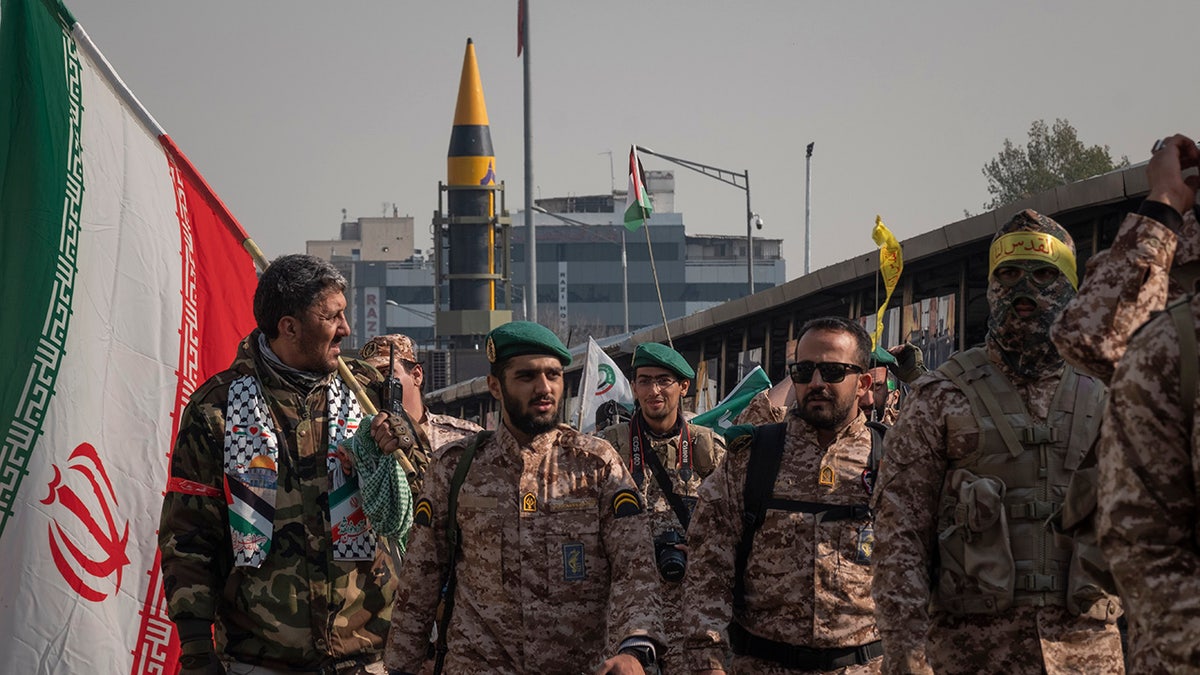
Islamic Revolutionary Guard Corps military personnel are walking along Enghelab (Revolution) Avenue as an Iranian Kheibar Surface-to-Surface missile is being unveiled during the Ela Beit Al-Moghaddas (Al-Aqsa Mosque) military rally in Tehran, Iran, on Nov. 24, 2023. (Morteza Nikoubazl/NurPhoto via Getty Images)
That includes a $10 billion sanctions waiver so Iraq can trade to obtain electricity from Iran, a $6 billion sanctions waiver agreed for South Korea to transfer money in exchange for the release of five Americans and $3.8 billion gained through the sale of petrochemicals in order to dodge a Trump-era sanction.
The U.S. State Department in March came under fire for resuming a sanctions waiver, which had been renewed since the Trump administration first issued the waiver in 2018. Some experts estimated the waiver as having a valuation of around $10 billion for Iran.
IRAN COURT SENTENCES POPULAR RAPPER TO DEATH FOR INVOLVEMENT IN PROTESTS, LAWYER SAYS
That waiver particularly allowed for the transfer of funds between Iran and Iraq so that Iraq, which remains a U.S. ally, could continue to use electricity imported from Iran – but critics saw it merely as another easement on sanctions against Iran.
“None of this money goes to the mullahs. None of this money goes into Tehran. The sanctions relief that is provided actually goes to vendors that provide humanitarian assistance to the Iranian people,” White House national security advisor John Kirby told reporters at the time.
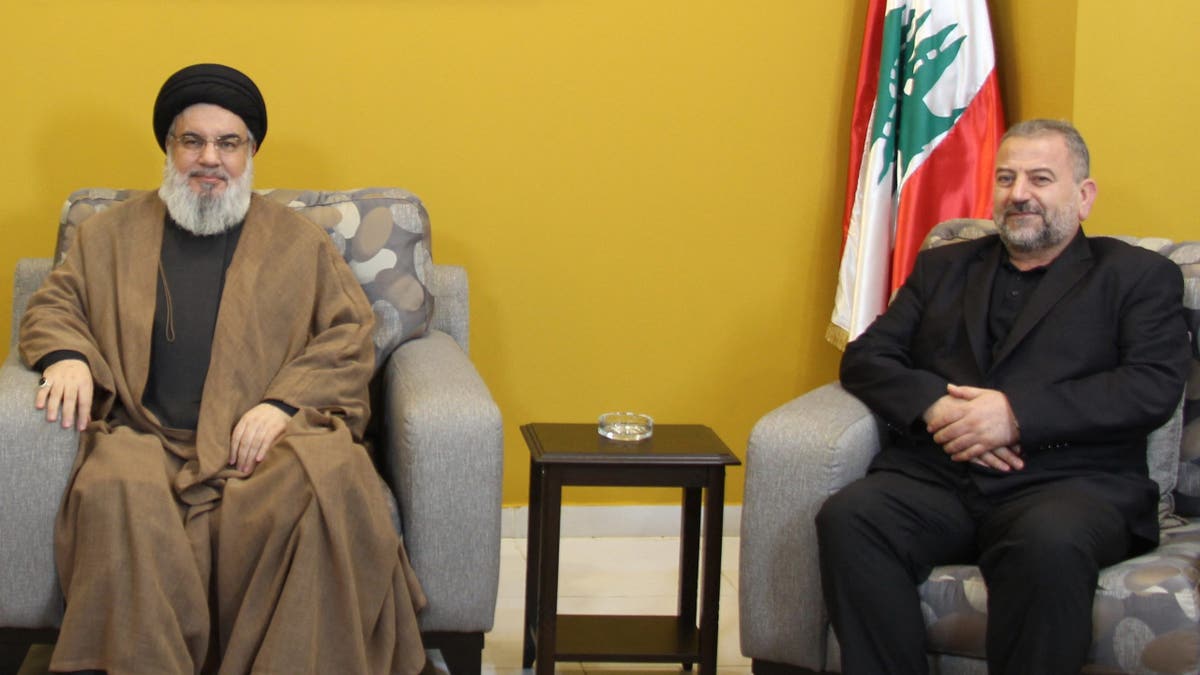
This file handout picture provided by Hezbollah’s media office on Sept. 2, 2023 shows the Lebanese Shiite group’s Secretary General Hassan Nasrallah, left, during a meeting with the deputy chief of the Palestinian Hamas movement, Saleh al-Aruri, at an undisclosed location in Lebanon. (Hezbollah’s Media Office/AFP via Getty Images)
“Not only do the Iraqi people not suffer because of this, the Iranian people aren’t going to suffer because of this,” Kirby added. “That allows for Iraq to be able to work its way off of Iranian energy so that they can keep the lights on.”
Schanzer countered the administration’s argument by noting that “as soon as [money] hits the system, it is going to be diverted or used in a cynical way,” even taking what humanitarian aid gets into the country through third-party vendors and reselling it to the civilian population, effectively laundering the assistance into money.
IRAN REJECTS ARGENTINA’S PUSH TO ARREST INTERIOR MINISTER FOR 1994 JEWISH CENTER BOMBING
“When we talk about dual-use goods or even things that they need in order to feed their fighters things along those lines, it is a consistently cynical diversion scheme,” Schanzer said. “Whether we’re talking about Iran itself or we’re talking about Iran’s proxies.”
“When the administration was saying that we shouldn’t be putting sanctions on the Houthis because it would ultimately block humanitarian assistance from getting into Yemen – guess what?” Schanzer continued. “When that humanitarian assistance gets to Yemen, who benefits? The people that control the territory in question, which right now a large chunk of Yemen is controlled by the Houthis.”
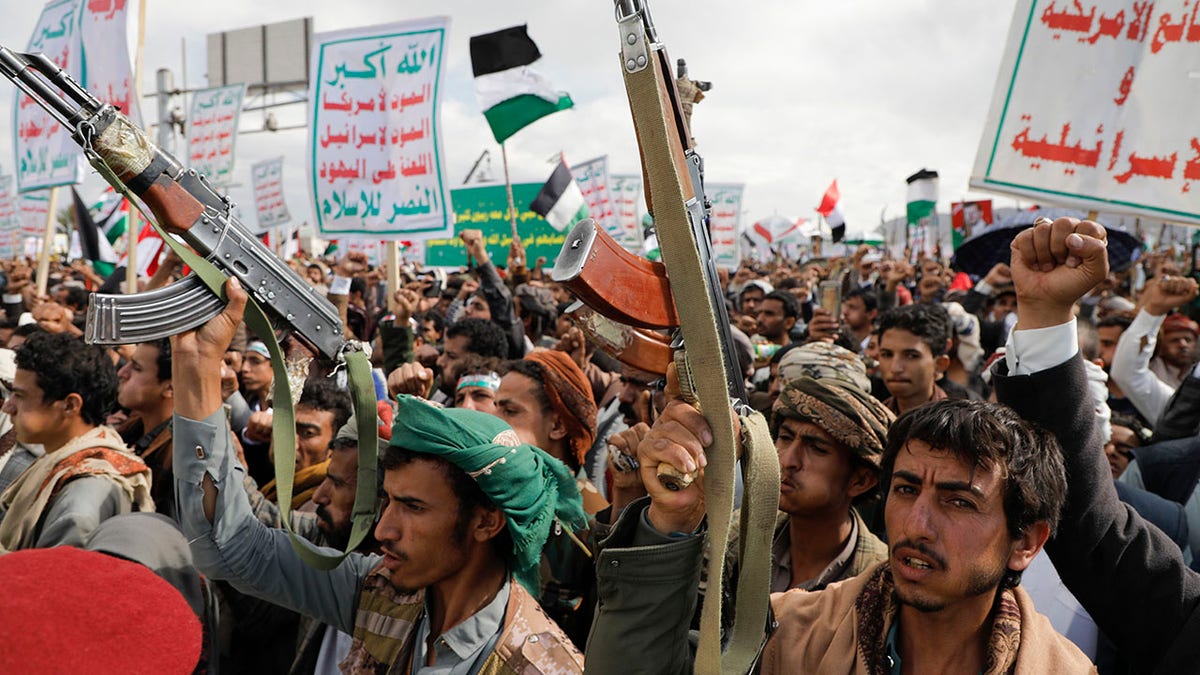
Houthi supporters attend a rally in Sanaa, Yemen, on March 8. (AP/Osamah Abdulrahman)
The New York Times in February published the results of an investigation that determined Iran had managed to sell “oil worth billions of dollars” thanks to “a significant gap in U.S. oversight.” Shipping vessels owned by shell companies and using “spoofing” methods to hide their location made dozens of trips throughout 2023 to ferry Iran’s oil under the sanctions.
The lack of a total crackdown on Iran’s oil shipments has led a significant number of experts to argue that the Biden administration may have started willfully turning a blind eye to Iran’s activities – partially since the surge in oil sales is clear and evident.
Javier Blas, a long-time energy and commodities reporter, wrote in a Bloomberg op-ed that “the conspiracy theorist inside me says the White House has turned a blind eye to the Iranian sales because it’s more worried about inflation … not only has Iran boosted oil production, but its exports have surged even more because it’s been able to sell a large chunk of the crude it was forced to put in the past into storage, both onshore and into tankers turned into floating storage facilities.”
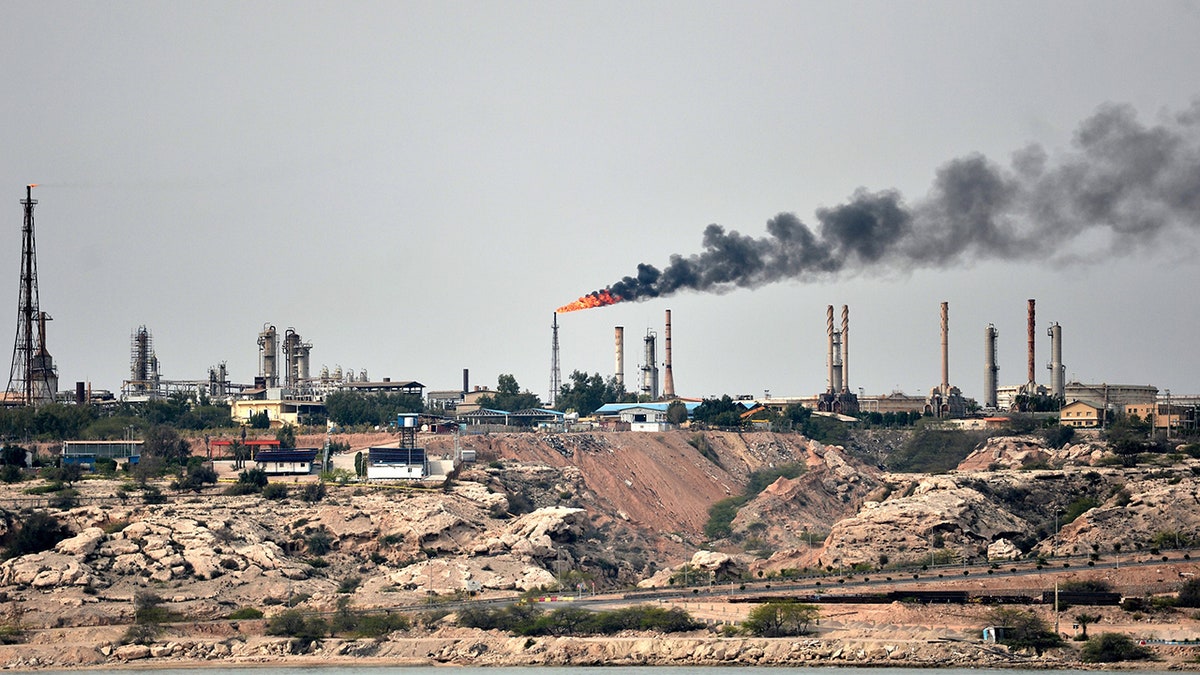
A general view of the Port of Kharg Island Oil Terminal, 25 kilometeres from the Iranian coast in the Persian Gulf and 483 kilometers northwest of the Strait of Hormuz, in Iran on March 12, 2017. (Fatemeh Bahrami/Anadolu Agency/Getty Images)
Iran’s growing cooperation with China also plays a significant role in how the country has managed to dodge sanctions, according to Foreign Policy, which cited a 25-year economic cooperation agreement the two countries agreed to in March 2021, as well as Iran’s decision to join the Beijing-led BRICS economic bloc, which gives Iran access to other currencies and trading options.
“There’s no question that Russia, China and others are working to provide assistance to the Iranians,” Schanzer claimed. “We know this to be the case, but, with the Russians and Chinese, it’s often done in trade or in arms purchases, oil … if they get remuneration in rubles or in RMB (Chinese Yuan) in trade surplus where they can cash in for other products that’s not the same as dollars, and it’s not the same as some of the goods that will come through American channels.”
Fox News Digital’s Caitlin McFall contributed to this report.
-

 Education1 week ago
Education1 week agoVideo: Dozens of Yale Students Arrested as Campus Protests Spread
-

 World1 week ago
World1 week agoEU sanctions extremist Israeli settlers over violence in the West Bank
-

 Politics1 week ago
Politics1 week agoFetterman hammers 'a–hole' anti-Israel protesters, slams own party for response to Iranian attack: 'Crazy'
-

 World1 week ago
World1 week agoPeriod poverty still a problem within the EU despite tax breaks
-
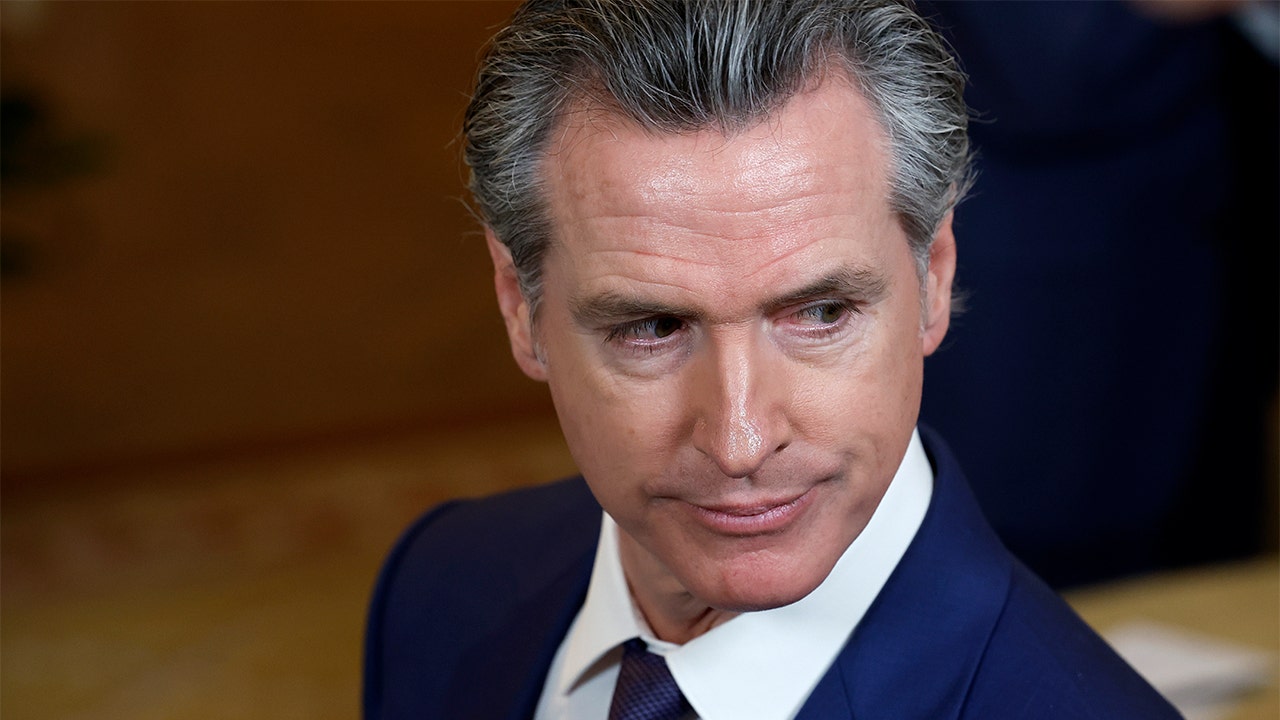
 Politics1 week ago
Politics1 week agoA battle over 100 words: Judge tentatively siding with California AG over students' gender identification
-

 Movie Reviews1 week ago
Movie Reviews1 week agoShort Film Review: Wooden Toilet (2023) by Zuni Rinpoche
-

 World6 days ago
World6 days agoHaiti Prime Minister Ariel Henry resigns, transitional council takes power
-

 News7 days ago
News7 days agoLarry Webb’s deathbed confession solves 2000 cold case murder of Susan and Natasha Carter, 10, whose remains were found hours after he died
